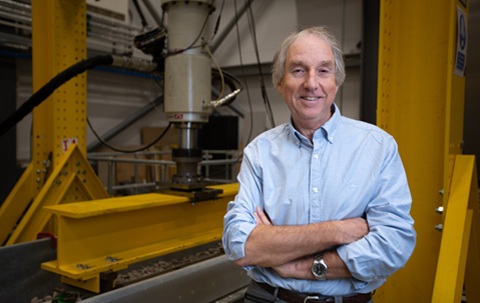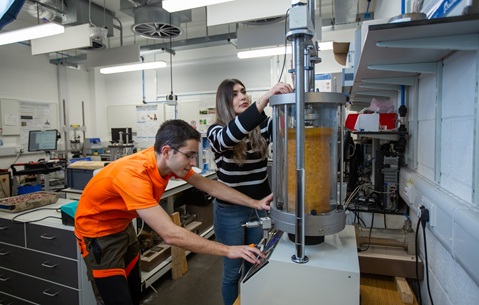.jpg)
Engineers at the University of Southampton are leading the way in ensuring the UK's railways are future-proofed and resilient to climate change - using science to reach the most economical and effective solutions.
Their work has saved billions of pounds of public money and improved the resilience of the ageing rail network.
The University's pioneering research has now won royal recognition, scooping a prestigious Queen Elizabeth Prize for Higher and Further Education.
William Powrie, Professor of Geotechnical Engineering and a Fellow of the Royal Academy of Engineering, is in the driving seat.
He said: "It's quite amazing to get this recognition for the work we've done over many years. It's a real testament to everyone who has been involved, and to rail research and engineering in Southampton. We are passionate about applying fundamental science to solve real world problems, and it's fantastic to have this celebrated."

Professor Mark E. Smith, President and Vice-Chancellor of the University of Southampton, said: "We are immensely proud of the strength of our rail engineering research here in Southampton. It has been world-leading work for a sustained period making pioneering breakthroughs over many years, and it continues to have a huge impact on the rail network as well as the economy.
"We are honoured that this research has deservedly been awarded a Queen Elizabeth Prize for Education."
Two decades-worth of research has already delivered huge cost savings.
In railway electrification alone, high costs led the Government to pause a major programme in 2017. The University developed new standards to cut the need for bridge reconstruction, and to reduce the depth of the foundations for the support masts on overhead electrified lines. These two measures prompted the Government's decision to restart railway electrification, saving the UK economy several billion pounds.
Southampton-led research has also supported the move to more sustainable and less problematic railway embankments in the face of wetter winters and drier summers.
Embankments - raised areas of soil, often clay, that support tracks - tend to shrink in summer and swell in winter. By appropriate management of the right vegetation in the vicinity of the track, this seasonal movement can be minimised without compromising the stability of the slope in winter.
Professor Powrie said: "Railway infrastructure engineering has been traditionally based on experience and observation. We have worked to underpin this experiential and empirical evidence with scientific understanding. That enables us to look at how engineering practice needs to change in the light of changing usage, climate, materials, and construction and maintenance processes, and to avoid unnecessarily over-engineering."
The research is conducted at the UKCRIC (UK Collaboratorium for Research on Infrastructure and Cities) National Infrastructure Laboratory in Southampton.
This facility, houses machinery for testing materials under extreme loads, determining soil properties, and assessing the performance of full-size sections of complex infrastructure such as railway track systems and bridge deck components, plus a 130 g-tonne geotechnical centrifuge that enables 25 years of weather impacts to be modelled in about 24 hours.
Advancements in monitoring tracks and managing stresses on the rail network due to climate change continue to be led by research in Southampton. Introducing optical fibres to track monitoring is currently being developed.

Professor Powrie, who was awarded a CBE earlier this year for services to engineering, explained: "Working with colleagues in the Optoelectronics Research Centre, we have been able to carry out meaningful monitoring and analysis of signals from optical fibres in the track bed to give us a better understanding of what happens when trains pass over. It will enable us to design improvements, enhancements and remediations in a more targeted way and with more confidence.
"The ultimate goal is to use optical fibres that are already next to railway tracks, for example for communications purposes, to also understand track behaviour and condition."
Sir Damon Buffini, Chair of the Royal Anniversary Trust, added: "The Queen Elizabeth Prizes for Higher and Further Education celebrate the power of education to change the world for the better. This much-loved national honour recognises, at the highest level of state, outstanding work in UK universities and colleges, and the remarkable benefit they bring to our economy, society and the wider world."






